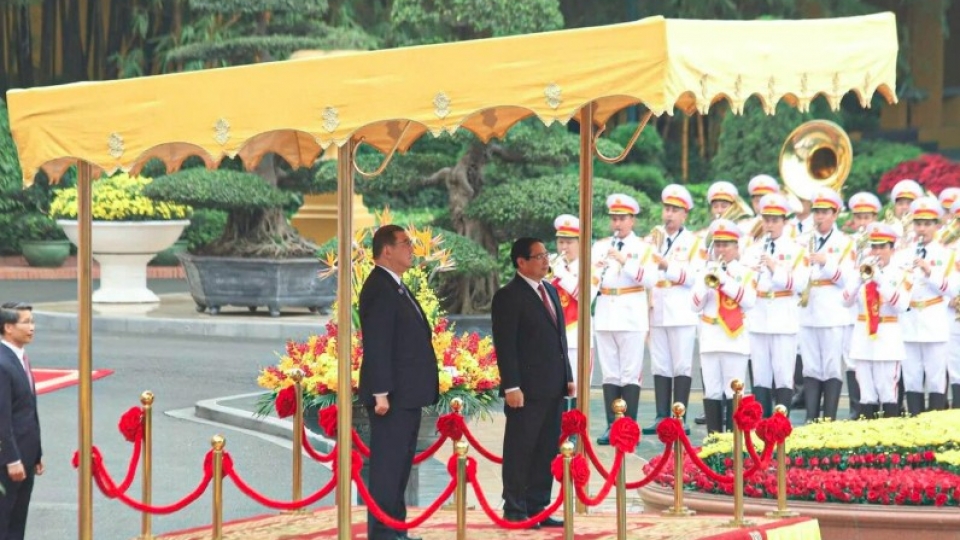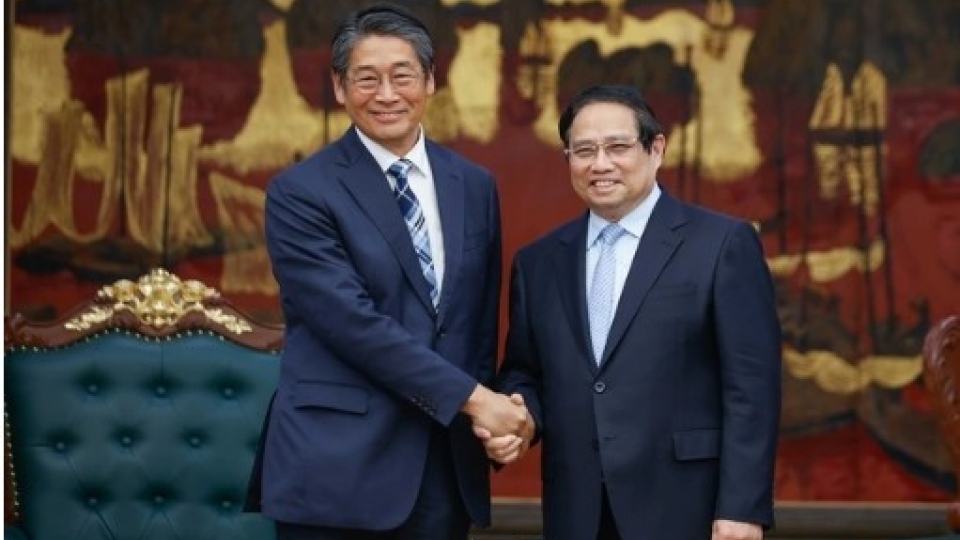Vietnam and Japan identify new pillars in bilateral relations
VOV.VN - Prime Minister Pham Minh Chinh and his Japanese counterpart Ishiba Shigeru have agreed to deepen economic cooperation as the main pillar of their bilateral relationship, while identifying cooperation in science and technology, innovation, and high-quality human resource training as a new pillar.
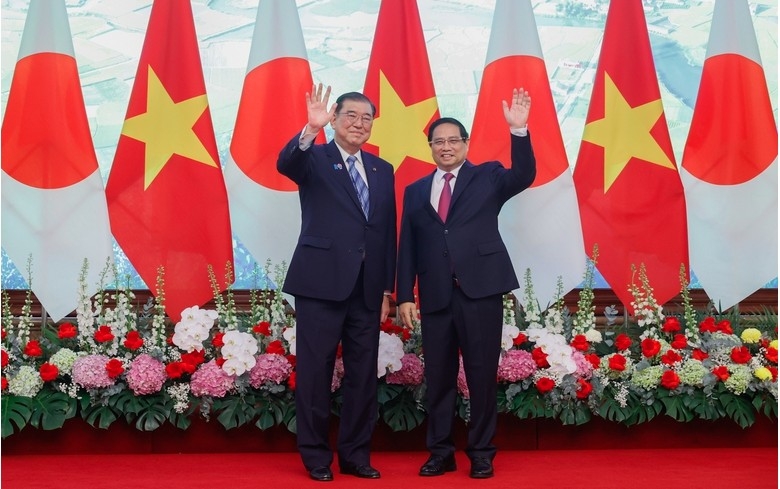
The consensus was reached during talks between PM Pham Minh Chinh and his Japanese counterpart, Ishiba Shigeru, in Hanoi on April 28, immediately following a welcome ceremony for the Japanese government leader."
At the talks, PM welcomed Ishiba’s first visit to Vietnam in his capacity as Japan’s Prime Minister and thanked Japan for its active support in helping Vietnam overcome the consequences of Typhoon Yagi and the COVID-19 pandemic.
PM Ishiba expressed his thanks for the warm and respectful reception by Prime Minister Pham Minh Chinh, the Government, and people of Vietnam, and shared his deep impressions of Vietnam's development since his last visit 35 years ago when he was a young legislator.
Vietnam considers Japan one of its most trusted and important partners, Chinh told his gust, while assessing that the bilateral relationship boasts vast potential for cooperation, based on political trust, long-standing people-to-people exchanges, and complementary strengths.
He thanked Japan for its contributions to Vietnam's socio-economic development, particularly through ODA funding and Japanese business investment. He also shared solutions in the strategic quartet to achieve industrialization and modernization, including breakthroughs in science and technology, political apparatus streamlining, development of private economic sectors, and promoting an independent, self-reliant economy, while ensuring deep and effective international integration.
PM Ishiba expressed high regard for Vietnam’s position and role in the region and the world, affirming that his nation will continue to support Vietnam's socio-economic development, help build an independent economy, and pursue industrialization and modernization, with a focus on science and technology development.
In a sincere, friendly, and trusting atmosphere, the two leaders had a comprehensive exchange on bilateral relations and regional and global issues of mutual concern. Both PMs expressed pleasure over the all-round development of the Vietnam-Japan Comprehensive Strategic Partnership, following the upgrade of their relations to this new framework nearly two years ago, and commended the positive progress achieved after two meetings between the two PMs in less than one year.
They also exchanged views and reached common perceptions on major directions and measures to elevate the bilateral relationship to new heights, entering a new era under the motto “sincerity, affection, trust, substance, effectiveness, and mutual benefit” in five main areas: political relations, economics, human resources connectivity, security and defence, science and technology – green transition, and cooperation at multilateral forums.
Both sides agreed to continue strengthening political trust through maintaining high-level visits and contacts annually, facilitating exchanges to soon realize the visit to Vietnam by the Japanese Emperor and Empress, enhancing the effectiveness of existing cooperation mechanisms and dialogues, and deepening defence and security cooperation, particularly in defence technology, settlement of the consequences of war, search and rescue operations, UN peacekeeping, and cyber security.
Both sides agreed to upgrade the strategic partnership dialogue mechanism at the Deputy Foreign Minister level to a 2+2 Deputy Foreign Minister - Defence Minister dialogue, with the first session to be held in 2025.
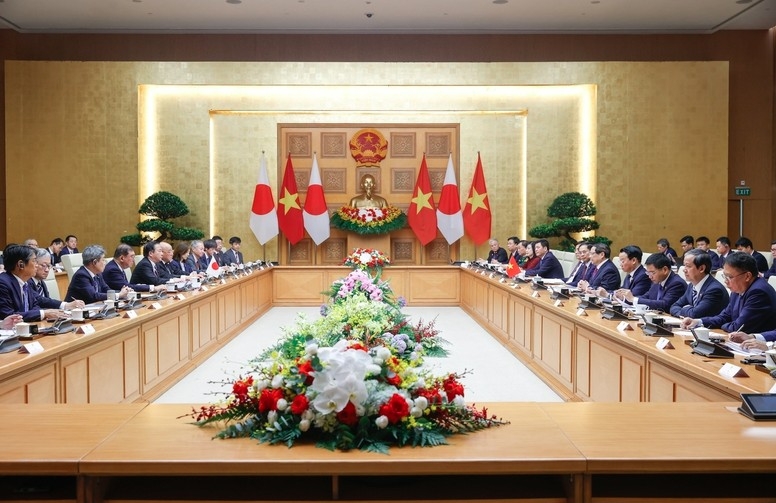
They consented to deepen economic cooperation, considering this the core pillar of the relationship, and to promote meaningful and sustainable economic linkages, while supporting each other in light of global economic challenges.
Host and guest concurred to accelerate new-generation ODA cooperation for strategic infrastructure projects and strengthen effective and sustainable investment and trade cooperation.
Following the positive progress in key projects such as the Ho Chi Minh City Urban Railway Line No. 1, the two sides agreed to speed up the progress of several symbolic projects such as the Vietnam-Japan University, the Cho Ray Hospital Phase II, and the Vietnam Space Center.
They also agreed to bolster high-tech agricultural cooperation, ensure food supply chains, and sign the Vietnam-Japan Agricultural Cooperation Vision for 2025-2030 this year.
The Vietnamese Government chief reaffirmed Vietnam’s commitment to improving the investment and business environment to facilitate Japanese investors.
Based on the common development strategy focusing on science, technology, and digital transformation, both PMs consented to cooperate on science, technology, innovation, and high-quality human resource training as a new pillar of bilateral relations, and to advance cooperation in fields such as digital economy, semiconductors, quantum technology, nuclear energy, IT, artificial intelligence, green transition, and energy transformation.
PM Chinh requested Japan to continue supporting Vietnam in training high-quality human resources, augmenting cooperation between research institutions, training centers, scientists, and businesses of both countries, providing scholarships for Vietnamese students and researchers, and assisting the Vietnamese community of 70 companies and 5,000 IT engineers to engage in Japan's IT supply chain.
PM Ishiba affirmed that Japan will support joint research projects and PhD training in semiconductors for Vietnam through the Japan-ASEAN Science, Technology, and Innovation Cooperation Project (NEXUS). Japan also aims to implement 15 energy transformation projects worth over US$20 billion under the Asia Energy Transition Initiative (AETI) and the Asia Zero Emission Community (AZEC).
The two leader agreed to further boost cooperation on disaster response, climate change, human resource connectivity through labor cooperation, locality-to-locality cooperation, and cultural and people-to-people exchanges.
They also consented to hold the Vietnam-Japan Local Forum at the end of 2025 and beef up cooperation in tourism and traditional culture.
Regarding the Vietnamese community in Japan, both sides agreed to initiate negotiations on the Vietnam-Japan Social Security Agreement and accelerate the construction of a Memorandum of Understanding on the new "Skills Development Employment" labor program in 2025.
Ishiba praised the contribution of more than 600,000 Vietnamese people in Japan and affirmed Japan's continued support for the Vietnamese community. Both sides also agreed to expand the issuance of Japanese visas for Vietnamese citizens, aiming for 2 million reciprocal tourist visits each year.
On regional and global issues, Chinh and Ishiba concurred to coordinate closely at international and regional forums such as ASEAN, Mekong, and the United Nations.
Both reaffirmed the importance of maintaining international order and a free, open, inclusive, and rules-based trade system, respecting the fundamental principles of international law and the UN Charter.
They affirmed the importance of maintaining peace and stability and resolving disputes in the East Sea (internationally known as South China Sea) through peaceful means, based on international law, particularly the 1982 United Nations Convention on the Law of the Sea (UNCLOS), the Declaration on the Conduct of Parties in the East Sea (DOC), and the early completion of an effective and enforceable Code of Conduct in the East Sea (COC).
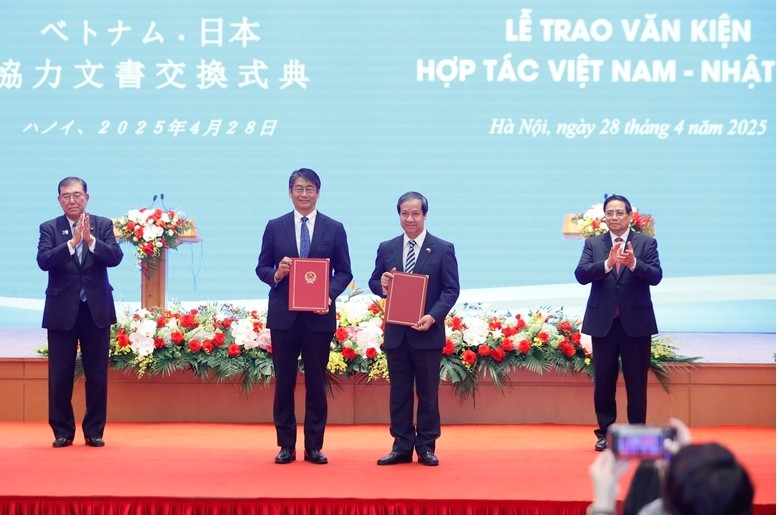
PM Ishiba reaffirmed Japan's support for Vietnam's successful hosting of APEC 2027 and actively considering sending a Japanese Government representative to the 16th UNCTAD Ministerial Conference in Hanoi in 2025.
Prime Minister Pham Minh Chinh thanked Japan for actively participating in the P4G Summit and announced that Vietnam will send a delegation to Vietnam Day at the Expo 2025 Osaka Kansai.
After the talks, Chinh and Ishiba Shigeru witnessed the signing ceremony of cooperation documents between the ministries and agencies of the two countries, met with the press to announce the major outcomes of their talks.
On the same day, the two PMs attended and delivered key speeches at the Vietnam-Japan Forum on cooperation in strategic industries, high-tech, green transition, and semiconductors.


